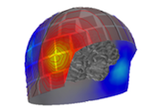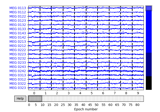mne.read_epochs_eeglab¶
- mne.read_epochs_eeglab(input_fname, events=None, event_id=None, eog=(), verbose=None, uint16_codec=None)[source]¶
Reader function for EEGLAB epochs files.
- Parameters
- input_fname
str Path to the .set file. If the data is stored in a separate .fdt file, it is expected to be in the same folder as the .set file.
- events
str|array, shape (n_events, 3) |None Path to events file. If array, it is the events typically returned by the read_events function. If some events don’t match the events of interest as specified by event_id, they will be marked as ‘IGNORED’ in the drop log. If None, it is constructed from the EEGLAB (.set) file with each unique event encoded with a different integer.
- event_id
int|listofint|dict|None The id of the event to consider. If dict, the keys can later be used to access associated events. Example:
{"auditory":1, "visual":3}
If int, a dict will be created with the id as string. If a list, all events with the IDs specified in the list are used. If None, the event_id is constructed from the EEGLAB (.set) file with each descriptions copied from
eventtype.- eog
list|tuple| ‘auto’ Names or indices of channels that should be designated EOG channels. If ‘auto’, the channel names containing
EOGorEYEare used. Defaults to empty tuple.- verbosebool,
str,int, orNone If not None, override default verbose level (see
mne.verbose()and Logging documentation for more). If used, it should be passed as a keyword-argument only.- uint16_codec
str|None If your *.set file contains non-ascii characters, sometimes reading it may fail and give rise to error message stating that “buffer is too small”.
uint16_codecallows to specify what codec (for example: ‘latin1’ or ‘utf-8’) should be used when reading character arrays and can therefore help you solve this problem.
- input_fname
- Returns
- epochsinstance of
Epochs The epochs.
- epochsinstance of
See also
mne.EpochsDocumentation of attribute and methods.
Notes
New in version 0.11.0.

